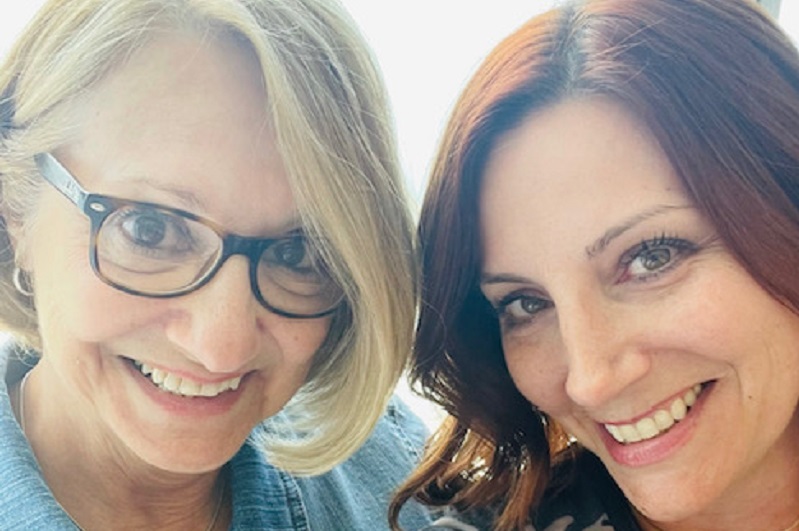Persistent Chest Pain, But Negative Test Results Lead to Lifesaving Procedure

February 26, 2024
Rosann Monaro, a 75-year-old Bergen County, New Jersey resident, was feeling chest pain for years when she went out for walks. As the mother of Danielle Monaro, co-host of the popular Elvis Duran and the Z100 Morning Show and health ambassador with Hackensack Meridian Health, she diligently got her heart checked and stayed on top of other important health screenings.
While Rosann’s chest pain persisted, all her tests came back showing no significant concerns. A trip to visit her grandson Spencer at school in Leeds, England, in late 2023 was a turning point for Rosann. “We were walking a lot, and the pain got so bad that even walking a block was hard,” says Rosann. “My grandsons kept saying, ‘Grandma, why are you walking so slow?’ I just knew something wasn’t right.”
A Definitive Diagnosis
Because Rosann’s symptoms were so persistent, and because she was very vocal about her concerns, her doctors determined it was time to do a cardiac catheterization. A cardiac catheterization is a procedure where a thin catheter is threaded directly into the coronary arteries, allowing physicians to see in real-time if there’s anything blocking blood flow to the heart.
“Unfortunately, no tests are 100% accurate; there are limitations,” explains interventional cardiologist Justin Lee, M.D. “When a patient describes severe symptoms like Rosann was experiencing, this is a necessary step to determine the cause.”
Through the cardiac catheterization, which took place at Hackensack University Medical Center, the Monaro family finally found the source of Rosann’s chest pain and exhaustion. “We were able to go in through the groin, inject contrast to directly visualize the coronary artery and see that Rosann had about 90% blockage in the biggest and most important artery of the heart,” says Dr. Lee. “Because of how severe the outcome could be, blockages in that artery are nicknamed the ‘widowmaker.’”
Navigating Challenges
In Rosann’s case, the blockage was particularly challenging because there was a lot of calcium buildup. “Calcium isn’t like regular plaque that can cause blockages,” says Dr. Lee. “When there’s calcium, picture a rock in the vessel wall. When the balloon is inserted and inflated to restore the blood flow in the artery, the balloon can’t expand completely because of the hard texture of the calcium, and therefore, the stent won’t be deployed with the intended integrity and caliber .”
Because of the severe calcium buildup, Dr. Lee first performed intracoronary lithotripsy, a technique that sends shockwaves through the calcium to break it into little pieces. “Once the calcium was fractured, we were able to optimally implant the stent to restore blood flow,” says Dr. Lee. Rosann was discharged that same day.

Rosann was thrilled to have a visit from the therapy dog, Primo, who helped comfort and calm her during her hospital stay.
Relief at Long Last
Rosann, who recently welcomed her 7th grandchild to the world, is so relieved with the outcome. “I was so excited to get the cardiac catheterization done because I knew they were going to find something,” she says. “They saved my life, and now I have energy again - I haven’t had energy in a long time.”
For Rosann’s daughter, Danielle, the results weren’t what she expected. “I was honestly convinced that her symptoms were because of her acid reflux,” she says. “After the procedure was done and I spoke to Dr. Lee, I cried with relief. I couldn’t imagine if she didn’t come in to get the catheterization.”
Rosann continues her recovery through cardiac rehabilitation three days a week, where she does supervised exercises to restore her strength and works with a dietitian to ensure she maintains healthy and nutritious eating habits.
And if there’s any lesson Rosann can share, it’s to take good care of yourself and listen to your body. She adds, “When you know something’s wrong, especially as a woman, you must push the issue. You know your body better than anyone, and you know when something isn’t right.”
Next Steps and Resources
- Meet our Source: Justin Lee, M.D.
- To make an appointment with Dr. Lee or a cardiologist near you, call 800-822-8905 or visit our website.
- Learn about cardiac care at Hackensack Meridian Health
- Schedule a heart screening near you.
The material provided through HealthU is intended to be used as general information only and should not replace the advice of your physician. Always consult your physician for individual care.






